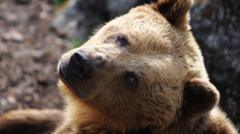Slovakia is reportedly moving forward with controversial plans to sell brown bear meat to the public, following the government's approval to cull a significant portion of its brown bear population. Amid increasing concerns over encounters between brown bears and humans, which have included fatal incidents, the Slovakian cabinet authorized the shooting of about 350 bears, or roughly 25% of the nation's estimated 1,300 bears.
The decision has sparked substantial backlash from environmentalists and opposition parties, particularly those represented in the European Parliament. While the European Union designates brown bears as "near threatened," Slovakia's government, led by Prime Minister Robert Fico, asserts that the culling is necessary for public safety after the nation experienced 54 bear attacks between 2000 and 2020. Fico emphasized the importance of community safety, stating, "We can't live in a country where people are afraid to go into the woods."
Despite the government's justification involving a bear overpopulation dilemma, critics, including ecologist Michal Wiezik from the opposition Progressive Slovakia party, argue that the cull is misguided. Wiezik contends that non-lethal measures and mitigation strategies ought to be prioritized instead of resorting to killing protected species. Nonprofits like Greenpeace Slovakia have also condemned the initiative, calling it "reckless" and in violation of conservation laws.
Starting next week, the sale of bear meat will be permitted, contingent upon adherence to strict legal and sanitary requirements as set forth by the environment ministry. State Minister Filip Kuffa made a statement emphasizing the practicality of utilizing the meat from culled bears rather than allowing it to go to waste. He maintains that bear meat is edible, which further categorizes the action as a potential food source.
Bear meat is not a common component of European diets, primarily found in certain eastern and Nordic regions, due to strict hunting regulations tied to species protection. Where it is consumed, there exist recognized health risks, particularly associated with Trichinella, a parasitic threat that mandates rigorous testing and cooking protocols to mitigate danger to human health.
As Slovakia embarks on this contentious path, it raises fundamental questions about the boundaries between wildlife management, legal protections for endangered species, and the rights of communities to coexist with nature. The effectiveness of such measures remains to be seen, as widespread criticism continues to underscore the complexities surrounding ecological and public safety issues related to brown bears.


















